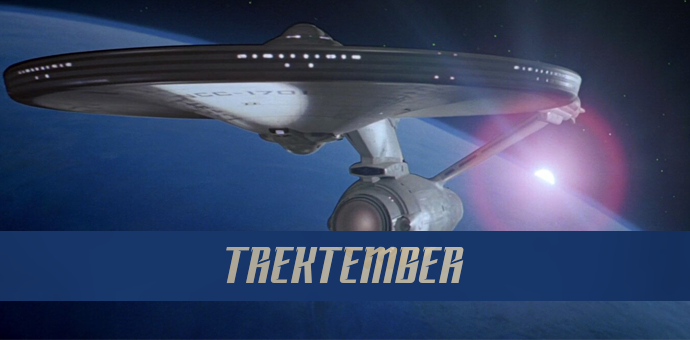Recap
Burnham raises concerns about the physical effects of spore drive jumps on the tardigrade creature, which places Stamets, Culber, and Acting Captain Saru at ethical odds after Captain Lorca is captured by the Klingons and the spore drive is needed in order to mount a rescue attempt. Aboard the Klingon prison ship, Lorca encounters Harry Mudd—a deceptive scoundrel with suspicious qualities—and a Starfleet lieutenant named Ash Tyler, who was captured at the Battle of the Binaries.
Review
This episode concludes the tardigrade story line from “The Butcher’s Knife Cares Not for the Lamb’s Cry” and introduces some new characters into the mix: the most familiar of which is Harry Mudd, played brilliantly by Rainn Wilson. He’s a bit less jovial and more cynical at this point, a decade before his initial appearance in The Original Series, but nonetheless the same self-interested deceiver we know him to be.
There are several moments in this episode—especially the conversation between Burnham, Tilly, and Stamets about the tardigrade—that strike me as awkwardly expositional. Of course, exposition is necessary, but in the fast-paced world of contemporary television writing, it can sometimes be difficult to introduce it smoothly and this episode contains some prime examples.
The capture of the captain is a time-honored Star Trek tradition/trope and Discovery gets right to bearing that torch in this episode with perhaps the most sympathetic portrayal of Captain Lorca to date. Learning of his background in the war, his photosensitivity, and his sacrifice of his own crew to spare them from torture and death at the hands of the Klingons all serve to lend humanity and sympathy to the character, while never intruding on his steely nature.
Firsts
This episode contains some firsts for Star Trek TV, if not for Star Trek in general, which I feel many readers of this blog may find concerning. As I explored what I find to be one of the most compelling thematic threads in this episode in my previous post, I thought I’d take this opportunity to address these firsts.
The First “F-bomb”
Well, there are two of them and they aren’t the first in Star Trek. Most people don’t realize it, but Star Trek’s first use of the Infamous F was in the 2009 Abrams film. The car chase scene with young Kirk early in the film is scored with the Beastie Boys song “Sabotage,” which contains the unedited line, “I got this f——ing thorn in my side.” Interesting to me is the fact that this first Trek F-bomb is a biblical reference, coming just before the lyric “Oh, my God.” But I digress.
 This episode does, however, contain the first ever utterance of the word by characters in Star Trek with Tilly’s exclamation, “You guys, this is so f——ing cool!” It’s fitting for Star Trek that its first venture into this lexical territory is with someone nerding out over cool science stuff. Tilly immediately apologizes for her outburst and Stamets reassures her, “No, Cadet. It is f——ing cool.”
This episode does, however, contain the first ever utterance of the word by characters in Star Trek with Tilly’s exclamation, “You guys, this is so f——ing cool!” It’s fitting for Star Trek that its first venture into this lexical territory is with someone nerding out over cool science stuff. Tilly immediately apologizes for her outburst and Stamets reassures her, “No, Cadet. It is f——ing cool.”
I’m not afraid of words, including the one I can’t reproduce in this post. I am, after all, an avid Martin Scorsese fan. However, I’ve never been entirely comfortable with the inclusion of not-ready-for-broadcast-TV language in Star Trek. It’s always been a hallmark of the franchise’s tendency toward family accessibility to avoid such things. However, it has also largely been a function of television standards. Discovery is exploring the prospect of telling Star Trek stories in a more decidedly adult-oriented fashion, and that’s not necessarily a bad thing. It’s one of the many changes, as I mentioned in my previous post, that express the particular creative freedom of this team.
Personally, I wouldn’t have gone there. But it’s handled very well and makes for a funny, sweet moment. The question relevant here is: why do I feel the particular onus to bring up this small moment within the context of a Christian perspective? The answer, of course, is that Christian culture—particularly Evangelical Christian culture in the West—tends to take a dim view of such language and its use in media. I remember selling the TV censoring device “TV Guardian” during my days in Christian retail, and it’s no secret that Evangelicals are a huge portion of the audience for services like VidAngel.
As a parent, I certainly want to impart to my child the use of kind language over unkind language, but I do believe it’s important to ask whether an aversion to certain words represents a focus on ethics or on moralism. The Bible itself uses words that were classified in its original languages in ways that would have kept them off ancient broadcast media, had they existed, demonstrating (depending upon your view of Scripture) that there may indeed be a time and place for, to quote Spock in Star Trek IV, “colorful metaphors.”
In any case, remembering that cultural stigmas change and language shifts, it seems important to focus less on words and more on message. Whatever alterations in content happen in Discovery, the more essential question is whether the soul of Star Trek remains. For myself, I find it wholly intact.
But the other consideration regarding moralism and ethics is that Christians who focus too narrowly on obeying certain rules of expression can get so caught up in how something is said that they miss what is being said. I recall a moment during a church community group meeting when a young woman was pouring her heart out about her past abusive relationships, dropping several choice words in the tear-filled process, and the group leader gently reminded her to watch her language. Let’s be about the business of caring for people long before we critique their vocabularies.
The Gay Couple
 It’s Star Trek’s second same-sex couple, actually; the first being Sulu and his husband in Star Trek Beyond (that is, apart from episodes depicting relationships with sci-fi caveats like alien creatures and mirror universes). But Lieutenant Stamets and Doctor Culber are revealed at the end of this episode to be Star Trek’s first ongoing gay couple in a series, though a re-watch of these two episodes reveals some hinting in the married couple-style banter between the two before they are seen expressing their affection for one another while brushing their teeth together at the end of this episode. And let’s not fail to mention Star Trek’s inclusion of very few ongoing romantic relationships aboard any of its vessels or stations heretofore, making Stamets and Culber a standout, regardless of their gender.
It’s Star Trek’s second same-sex couple, actually; the first being Sulu and his husband in Star Trek Beyond (that is, apart from episodes depicting relationships with sci-fi caveats like alien creatures and mirror universes). But Lieutenant Stamets and Doctor Culber are revealed at the end of this episode to be Star Trek’s first ongoing gay couple in a series, though a re-watch of these two episodes reveals some hinting in the married couple-style banter between the two before they are seen expressing their affection for one another while brushing their teeth together at the end of this episode. And let’s not fail to mention Star Trek’s inclusion of very few ongoing romantic relationships aboard any of its vessels or stations heretofore, making Stamets and Culber a standout, regardless of their gender.
I’m well aware that, unlike the use swear words, the topic of homosexuality is one about which Christians have strong enough views to, sadly, break fellowship over their differences. But it’s also true that, depending upon their doctrine, sexuality, and social views, a Christian reading this article may be anywhere on the spectrum from being deeply offended by the portrayal of same-sex relationships, to being supportive of it, to being in a same-sex relationship themselves.
I want to say that all of you have understandable points of view. I obviously can’t personally agree with all of them, but I can absolutely respect them. As with the linguistic concerns mentioned above, though, I believe it important to choose ethics over moralism. That is to say that the central call of the Christian life is to love our neighbors—even, and perhaps especially, those with whom we disagree.
So I won’t tell you what I think your response to this on-screen couple ought to be, apart from one thing: Recognize them as human beings whom God loves, exactly as they are. True, they are not a real-life couple. But how we view fictional characters is often a window into how we view real people and I would encourage readers of this piece to view and treat people first and foremost with love and compassion. The love of God is something none of us earns. Our love, therefore, if it is to reflect the love of God, ought also to be given without discrimination.
I will add as well that Star Trek isn’t here to tell stories that make us comfortable. We might not like hearing certain language or seeing certain types of relationships, but Star Trek is and always has been, if nothing else, inclusive. It would serve us well to remember that the love of God is also inclusive and, like the land owner in Jesus’ parable who gave the same wage to all of his workers, no matter when they arrived at his field, the tent of God’s love includes those whom God loves, not only those with whom we are comfortable.
Therefore, how can we as Christians view in a constructive way a Star Trek that includes elements with which we may be uncomfortable? I think it lends us the opportunity to view characters as people first. Regardless of their gender, how do Stamets and Culber feel about one another? What are they expressing in their scenes together—in their harmonies and conflicts—and what does this tell us about who they are as people? What does Tilly’s outburst and Stamets’ reassurance show about these characters’ passion for science and discovery?
People are People
As we ask questions about how Star Trek’s values and soul are carried on through its inclusion of heretofore unseen levels of violence, conflict between crew members, types of relationships, and those “colorful metaphors,” we can help ourselves to see beyond the stuff of life in the real world that may distract us from the ever-present human condition.
We may be able to better see that people are people, no matter how strongly we may disagree with them or how difficult we find it to see their point of view, and that God loves them exactly the same as us and all humanity—exactly as we are. How, then, might we show that love in ways that will be meaningful to our neighbors? Let us consider love as the linchpin of our lives and actions, long before we quote the rules as we see them.
As Original Series and Animated Series writer David Gerrold told me in words I used as the inscription for my first book, “The primary philosophy in Star Trek, stripped of everything else, was ‘Love one another.’ I think Jesus might have said something like that once too.”
With this in mind, how do we feel about the true ethical questions in this episode—the ones I mentioned in my previous post regarding the tardigrade, and Lorca’s decision to leave Mudd behind on a Klingon prison ship? Lorca would rather kill his crew himself than leave them in the hands of the Klingons. Is Lorca showing love by leaving Mudd behind?
How does this compare with Kirk’s treatment of Khan in “Space Seed?” What other options did Lorca have and what different choices might he have made? Or did he make the right choice? Then there’s Lorca’s sacrifice of his own crew on his previous ship. Was mercy killing the highest good in that situation? Recall Picard’s words about killing Borg-assimilated crew members in Star Trek: First Contact, “You will be doing them a favor.”
Then there is the revelation that Lorca’s photosensitivity is an injury he sustained in the explosion that killed his previous crew. “We choose our own pain,” he says, “Mine helps me remember.” Lorca recognizes the gravity of his choice, even as he believes it was the right one to make. Still, he seems to have almost chosen a form of self-punishment for his actions. How we deal with our past has a deep impact on who we are. And, as Kirk said in Star Trek II, “How we deal with death is at least as important as how we deal with life.”
Discomfort and Discovery
The soul of Star Trek lives on in Discovery as the series continues to explore these questions of life, death, ethics, and the human condition. In a way, it’s important that the series includes things that can cause discomfort. The human race and our life on this planet also include such things. And there is no TV Guardian for life. We must therefore engage our world as it is and our neighbors as they are. In this way, like Star Trek, we can seek to to stay true to the soul of who God calls us to be.
“They say confession is good for the soul,” Harry Mudd says, “Too bad none of us have one anymore.” I don’t think Lorca shares that view. Neither does Star Trek, and neither does the gospel. There is no one beyond rescue and no pain—chosen or not—wherein God is not present.
• • •
Trektember is an annual series about Star Trek; this year, we’re examining the first seasons of Star Trek: Discovery and The Orville. For more information on this series, click here; or, to read every article from the beginning, click here!


